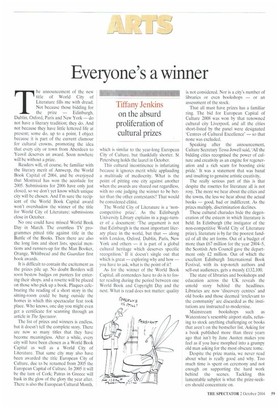Everyone's a winner
Tiffany Jenkins on the absurd proliferation of cultural prizes
The announcement of the new title of World City of Literature fills me with dread. Not because those bidding for the prize — Edinburgh, Dublin, Oxford, Paris and New York — do not have a literary tradition; they do. And not because they have little lettered life at present; some do, up to a point. I object because it is part of the current clamour for cultural crowns, promoting the idea that every city or town from Aberdeen to Yeovil deserves an award. Soon nowhere will be without a prize.
Readers will, of course, be familiar with the literary merit of Antwerp, the World Book Capital of 2004, and be overjoyed that Montreal has won the accolade for 2005. Submissions for 2006 have only just closed, so we don't yet know which unique city will be chosen. And I'm sure the recipient of the World Book Capital award won't overshadow the winner of the title for World City of Literature; submissions close in October.
No one could have missed World Book Day in March. The countless TV programmes pitted title against title in the Battle of the Books. Then there are also the long lists and short lists, special mentions and runners-up for the Man Booker, Orange, Whitbread and the Guardian first book awards.
It is difficult to contain the excitement as the prizes pile up. No doubt Borders will soon bestow badges on punters for entering their shops, and a rosette will be placed on those who pick up a book. Plaques celebrating the reading of a short story in the sitting-room could be hung outside the homes in which this spectacular feat took place. Who knows, one day you might even get a certificate for scanning through an article in The Spectator.
The list of prizes and winners is endless, but it doesn't tell the complete story. There are now so many titles that they have become meaningless. After a while, every city will have been chosen as a World Book Capital as well as a World City of Literature. That same city may also have been awarded the title European City of Culture, due to be renamed from 2005 the European Capital of Culture. In 2005 it will be the turn of Cork; Patras in Greece will bask in the glow of the glory the year after. There is also the European Cultural Month, which is similar to the year-long European City of Culture, but thankfully shorter. St Petersburg holds the laurel in October.
This cultural incontinence is infuriating because it ignores merit while applauding a multitude of mediocrity. What is the point of pitting one city against another when the awards are shared out regardless, with no one judging the winner to be better than the other contestants? That would be considered elitist.
The World City of Literature is a 'noncompetitive prize'. As the Edinburgh University Library explains in a page-turner of a document: 'The argument is not that Edinburgh is the most important literary place in the world, but that — along with London, Oxford, Dublin, Paris, New York and others — it is part of a global cultural heritage which deserves specific recognition.' If it doesn't single out that which is great — exploring why and how — you have to ask, what is the point of it?
As for the winner of the World Book Capital, all contenders have to do is to foster reading during the period between one World Book and Copyright Day and the next. What is read does not matter: quality is not considered. Nor is a city's number of libraries or even bookshops — or an assessment of the stock.
That all must have prizes has a familiar ring. The bid for European Capital of Culture 2008 was won by that renowned cultural city Liverpool, and all the cities short-listed by the panel were designated 'Centres of Cultural Excellence' — so that none was excluded.
Speaking after the announcement, Culture Secretary Tessa Jowell said, 'All the bidding cities recognised the power of culture and creativity as an engine for regeneration and a rich seam for boosting civic pride.' It was a statement that was banal and insulting to genuine artistic creativity.
The really serious part of this is that despite the rosettes for literature all is not rosy. The more we hear about the cities and the towns, the less we hear about the actual books — good, bad or indifferent. As the prizes multiply, discrimination declines.
These cultural charades hide the degeneration of the esteem in which literature is held. In Edinburgh (the instigator of the non-competitive World City of Literature prize), literature is by far the poorest funded of all the art forms. Out of a budget of more than £67 million for the year 2004-5, the Scottish Arts Council gave the department only £2 million. Out of which the excellent Edinburgh International Book Festival, with its top-notch authors and sell-out audiences, gets a measly £132.100.
The state of libraries and bookshops and education across the UK reveals the untold story behind the headlines. Libraries are now 'discovery centres' and old books and those deemed 'irrelevant to the community' are discarded as the institutions are instructed to modernise.
Mainstream bookshops such as Waterstone's resemble airport stalls, refusing to stock anything challenging or books that aren't on the bestseller list. Asking for a book published more than three years ago that isn't by Jane Austen makes you feel as if you have morphed into a grumpy old man asking for the most obscure tome.
Despite the prize mania, we never read about what is really good and why. Too much time is spent on ceremony and not enough on supporting the hard work behind the scenes. Tackling this lamentable subplot is what the prize-seekers should concentrate on.


















































































 Previous page
Previous page